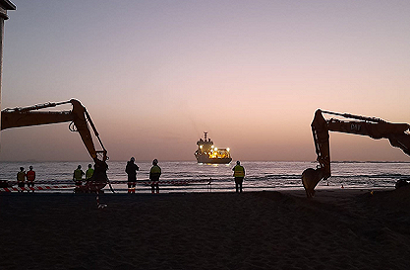Vodafone connects Iberian Peninsula and Canary Islands with 2Africa submarine cable

The world's largest submarine cable system will be operational in the first half of 2024
The 2Africa submarine cable has arrived in the Canary Islands, in its first step to connect the archipelago to the Iberian Peninsula via fibre optics. Vodafone and Canalink, a company supported by the Cabildo of Tenerife through the Technological Institute of Renewable Energies (ITER), have been responsible for this advance.
The mooring operation was carried out on Salinetas beach (Telde, Gran Canaria), where a presentation ceremony was organised in which the attendees, both from the company and from the various public institutions involved, highlighted the importance of this system for providing quality connectivity to all the islands.
€12million investment
2Africa is the world's largest submarine cable system. The project was launched in May 2020 with the aim of significantly increasing the capacity, quality and availability of internet connectivity between Africa and the rest of the world. When completed, it will connect 33 countries in Europe, Africa and Asia, reaching a population of around 3 billion people.
The total length of the cable is 45,000 kilometres, including the 330-kilometre Canary Islands branch line, which is part of the 2Africa West system. As Canalink reported, it will have a capacity of 180 terabits per second. The public company values the investment at 12 million euros, which is split 50-50 in this public-private partnership project.
International consortium
Vodafone is one of eight international partners in the 2Africa consortium, alongside Bayobab, Center3, China Mobile International, Meta, Orange, Telecom Egypt and WIOCC. The British company has led the installation of the Canary Islands branch line, which will meet telecommunications needs by facilitating the evolution towards 5G networks and ultrafast broadband, while improving other services, such as mobile voice and data and fixed telephony. Alcatel Submarine Networks is responsible for manufacture and installation.
Vodafone's Regional Director in the Canary Islands, Javier Álvarez, explained at the inauguration that, “The world's largest submarine cable, with a capacity of 180 terabits per second, arrives today in Telde to continue promoting internet connectivity and digital inclusion for all citizens and businesses in the Canary Islands. We are delighted to be part of this project which, thanks to public-private collaboration, will enable the digitisation of critical industries, facilitate the evolution towards advanced 5G services and enhance the economic growth of the islands.”
Photo: Vodafone




